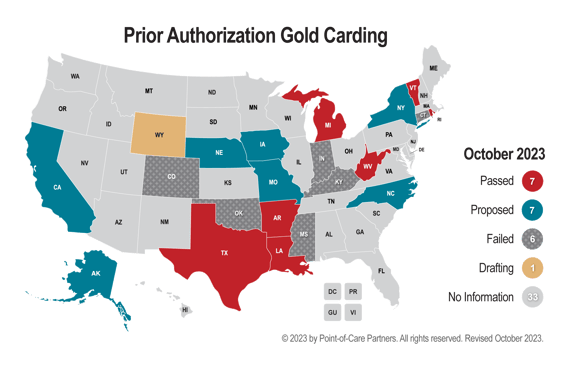The concept of "Gold-carding” is an emerging policy trend that has the potential to significantly transform prior authorization (and claims) procedures. As an evolving concept, it is worth examining gold-carding more closely, including the states where it is gaining traction and the ongoing discussions about its implications.
Understanding Gold-Carding
Gold-carding is a policy designed to exempt certain healthcare providers from often-cumbersome prior authorization requirements. Under this system, providers with a proven track record of prior authorization approvals would be granted a “bye” from requesting prior authorization for certain medical services, procedures, or medications. In essence, it aims to streamline the process for those healthcare professionals who consistently meet certain approval criteria and removing barriers to patients obtaining expeditious access to treatment, services, and medications.
Firsts in Passing Policy – West Virginia and Texas
West Virginia in 2019 and Texas in 2020 were the first two states that passed legislation to require health plans to implement gold-carding procedures. Both states, and what is now becoming a common theme in passed, pended, and failed legislation, is a 90% threshold, i.e., physicians who maintain a 90% prior authorization approval rate over a certain period of time (usually 6 months) on certain services are eligible for exemption under this law.
States in Contemplation
Many other states like Arkansas, Louisiana, Michigan, and Vermont have followed suit, bringing the total number of states with such laws to six. Additionally, Alaska, California, Colorado, Connecticut, Indiana, Iowa, Kentucky, Massachusetts, Mississippi, Missouri, Nebraska, New York, and Oklahoma are considering (pending) or have considered (failed) similar legislative measures. As it stands, half of the U.S. states are actively exploring or have already passed gold-carding laws.
Federal Considerations
As of now, no federal legislation on gold-carding has passed, however, H.R 7995 was introduced in the 117th congress in June 2022 but did not pass prior to the end of session . While federal legislative efforts haven’t yet gained traction, it’s important to note that since 2020, the Centers for Medicare & Medicaid Services (CMS) has been considering incorporating gold carding in various proposed policies. These include the Advancing Interoperability and Improving Prior Authorization Processes (CMS-0057-P) as well as the Contract Year 2024 Policy and Technical Changes.
Support and Opposition
Gold-carding has garnered support from various healthcare stakeholders, including the American Medical Association (AMA), the American Society of Clinical Oncology (ASCO), and the American Hospital Association. These organizations contend that gold-carding could alleviate the administrative burden on physicians, enhance patient access to care, and lead to cost savings.
However, not everyone is on board. Some insurers have voiced concerns about the potential drawbacks of gold-carding. They argue that it might result in higher healthcare costs and potentially compromise the quality of care. Additionally, there are concerns about the practicality of implementing and enforcing such a system as implementing gold carding not only impacts utilization review systems, workflows and processes but there also must be alignment and changes in the claims and billing process, not a small undertaking.
The Ongoing Debate
The gold-carding debate is far from settled. As more states consider enacting gold-carding laws and the federal government continues to weigh its options, the future of this policy remains uncertain. It's a topic that will continue to generate discussions and negotiations between healthcare providers, insurers, and policymakers.
Gold-carding represents a potential shift in the way prior authorization operates in healthcare. The support from healthcare organizations and clinicians is significant, as it aims their perspective is it simplifies processes and improves patient access to care. Gold-carding will clearly remain a subject of ongoing discussion and scrutiny among healthcare providers, patient advocates, insurance companies, and policymakers. As these efforts surface, it will be crucial to monitor how this potentially game-changing policy unfolds and impacts the broader healthcare ecosystem.
If you're curious about how gold-carding policies might affect your organization, we're here to assist. We can offer you a comprehensive overview, along with strategic and operational recommendations. Feel free to reach out to me at kim.boyd@pocp.com with any questions you may have.




